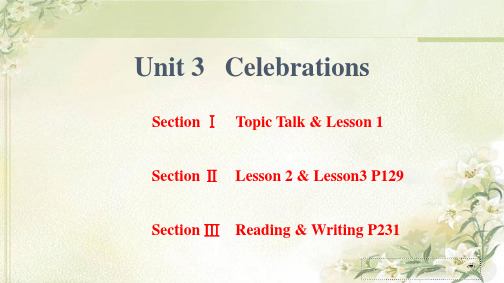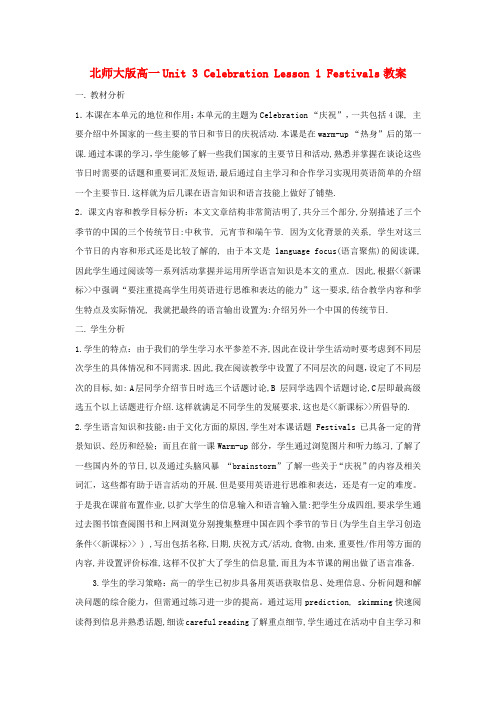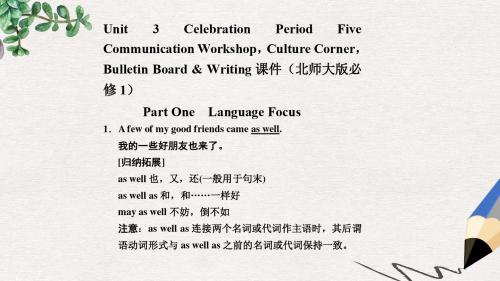北师大版高中英语必修一Unit 3《Celebration》(lesson 3)word教案
新教材北师大版高中英语必修第一册Unit3 Celebrations教学课件(284页)

5.We always have jiaozi during this time,as they mean something special on this occasion—they are a sign of our wishes for health and happiness in the coming year.
A.Right.
B.Wrong.
C.Not mentioned.
课本原文
SPRING FESTIVAL Tom Jenkins a 16-year-old exchange student living in Nanjing It was my first time spending Spring Festival in China with my host family ① .Spring Festival is highly ② valued ③ by every Chinese family.Preparations began a week before the festival.First, the house was cleaned from top to bottom④.My host mother Mrs Chen said this was to sweep away⑤ the dirt of the past year and get ready for the new year.
○23
retired .We do not see our children and grandchildren very often and we
高中英语Unit3《Celebration》Lesson1Festivals教案4北师大版必修1

北师大版高一Unit 3 Celebration Lesson 1 Festivals教案一. 教材分析1.本课在本单元的地位和作用:本单元的主题为Celebration “庆祝”,一共包括4课, 主要介绍中外国家的一些主要的节日和节日的庆祝活动.本课是在warm-up “热身”后的第一课.通过本课的学习,学生能够了解一些我们国家的主要节日和活动,熟悉并掌握在谈论这些节日时需要的话题和重要词汇及短语,最后通过自主学习和合作学习实现用英语简单的介绍一个主要节日.这样就为后几课在语言知识和语言技能上做好了铺垫.2.课文内容和教学目标分析:本文文章结构非常简洁明了,共分三个部分,分别描述了三个季节的中国的三个传统节日:中秋节, 元宵节和端午节. 因为文化背景的关系, 学生对这三个节日的内容和形式还是比较了解的, 由于本文是language focus(语言聚焦)的阅读课, 因此学生通过阅读等一系列活动掌握并运用所学语言知识是本文的重点. 因此,根据<<新课标>>中强调“要注重提高学生用英语进行思维和表达的能力”这一要求,结合教学内容和学生特点及实际情况, 我就把最终的语言输出设置为:介绍另外一个中国的传统节日.二. 学生分析1.学生的特点:由于我们的学生学习水平参差不齐,因此在设计学生活动时要考虑到不同层次学生的具体情况和不同需求.因此,我在阅读教学中设置了不同层次的问题,设定了不同层次的目标,如: A层同学介绍节日时选三个话题讨论,B 层同学选四个话题讨论,C层即最高级选五个以上话题进行介绍.这样就满足不同学生的发展要求,这也是<<新课标>>所倡导的.2.学生语言知识和技能:由于文化方面的原因,学生对本课话题 Festivals 已具备一定的背景知识、经历和经验;而且在前一课Warm-up部分,学生通过浏览图片和听力练习,了解了一些国内外的节日,以及通过头脑风暴“brainstorm”了解一些关于“庆祝”的内容及相关词汇,这些都有助于语言活动的开展.但是要用英语进行思维和表达,还是有一定的难度。
北师大版高中英语必修1 Unit 3《Celebration》(Period Five)课件

orphan. 他们因没有亲生儿女,所以决定领养一个孤儿。
Part One
本
课
栏
Part Two
目 开
关
[题组训练] 用 adopt,adapt 的适当形式填空
(1)We had to adapt quickly to the new system. (2)The adopted girl soon adapted to her new family.
目 开
解析 (1)as well 一般放在句尾,相当于 too,但不用逗
关
号隔开。
(2)too 用于肯定句中,多放在句尾,常用逗号隔开。
(3)also 一般用于句中,比 too 正式,通常用于行为动词
前或 be 动词之后。
(4)either 只用于否定句中,置于句尾。
Part One
本
课
栏
Part Two
Part One Part Two
[范文展示]
Last Saturday,many relatives,his close friends and I attended my cousin’s wedding ceremony at his
本 invitation.During the ceremony the best men helped put
本 圣人和巫婆的模样。
课
栏 [归纳拓展]
目
开 dress (sb.) up as...(把某人)装扮成……
关
dress up (给……)穿上盛装;(给……)乔装打扮 dress sb./oneself 给某人/自己穿衣(宾语是人,不是衣服) be dressed in 穿着……(后面跟衣服或表示衣服颜色的词)
北师大版高中英语必修1 Unit 3《Celebration》(lesson 1 )英文教案

《unit 3 lesson 1 Chinese Seasonal Festivals》教学指导Objectives■To use pictures to help understand new words and to use the dictionary to check meanings.■To read a text quickly to find specific information.■To practise the Present Simple Passive, PresentContinuous Passive, Past Simple Passive, Present Perfect Passive and Past Continous Passive.Resource usedGrammar Summary 5.Possible problemsStudents should be encouraged to use the Passive. It is used more in English than in many other languages.Background Communal celebrations mark events such as changing seasons, religious days or political events; music, dance or costume are usually involved. Routes through the material■If you are short of time, set some of the exercises for homework.■If you have time, use one of the Options ideas.■If you have two periods for this lesson, a suitable natural break is after Exercise 4. Language Power: pages 76?C77. Mini-Grammar 9ReadingBefore you startExercise 1■Students look at the pictures and guess what is happening and what is being celebrated. Ask them to describe what they can see.■Students discuss what their favourite seasons are and list the festivals in China which are associated with each season. Read to learnExercise 2■Students look at the three titles (Summer, Autumn, Winter) and suggest which festivals are associated with these three seasons in China and if there are any associated with Spring.■Students read the texts quickly and do the matching.AnswersPicture 1?CC the Dragon Boat FestivalPicture 2?CA the Mid-Autumn FestivalPicture 3?CB the Lantern FestivalExercise 3■Divide the class into three groups. Each group reads one section of the text carefully and writes four or five questions about it. Then give the class three orfour minutes to read the whole text again. Students close their books, and in turn eachgroup asks its questions for the rest of the class to answer.■Students read the text again and fill in the table with the text information they get. ■Have students check their answers in pairs.■Encourage students to add another festival they know well.■Students read the questions and find the answers in the texts by reading the texts again.■Have students talk about their festival in pairs.AnswersPassage A:the Mid-Autumn Festival, September or October, moon cakesPassage B:the Lantern Festival, the fifteenth of the first month of the lunar calendar, sweet dumplingsPassage C:the Dragon Boat Festival, the fifth day of the fifth month of the lunar calendar, Zongzi Exercise 4■Students discuss in pairs and tell the class their opinions.Language Power: the Word Corner on page 79 givesfurther practice in vocabulary (clothes).GrammarTHE PASSIVE (I)Exercise 5■Students identify that the passive is used when we don’t know or there is no need to say who the “doer” of an action is.■Students then do the exercise, finding the sentences in the text and completing the verbs.■Refer students to Grammar Summary 5 to make sure they understand how to use the Passive correctly.■For further practice, ask students to answer questions about their school (or town), e.g. “When are school examinations held?When are school reports written? Where is football played?When are bells rung? When was this classroom cleaned? When was this school built?”Answers1. are made2. were, organizedExercise 6■ Have students look at the given sentences and ask them what tenses are used in them.■ Encourage students to draw rules for the formation of the passive forms. Ask them to refer Grammar Summary 1,3,4 and 5 on pages 92?C93.Answers1. has been arranged2. is being collected3. was being paintedExercise 7■ Ask students if they have heard of the Water Festival.■ Students re ad the text to find out about the festival. Then read the text again and complete the verbs.Answers1. is celebrated2. is splashed3. are carried4. are told5. is related6. are washed7. are raced 8. are launched■ Have st udents close their books and ask them to say what they can remember about the festival.Exercise 8■ Students work in pairs, changing the sentences into the passive. Answers1. My health is being affected by stress.2. People are being moved out of the houses.3. The mini-helicopter has already been invented by him.4. The forest fire has been put out by them.5. The car was being repaired when I got there.6. The house was being decorated when the accident happenedVocabularyExercise 9■ Student s may need to go back to the text to review the words before they start filling in the blanks.Answers1. is lit2. has decorated3. mark4. celebrate5. was included6. was burnt down7 take part in 8. be boiledLanguage in UseExercise 10■ Students work in groups, writing out the questions andadding more of their own questions using the Passive. Tell students they must know the answers to their questions. If you wish, they can finish the questions for homework and use reference sources to check their answers. Each group should have between 10?C15 questions.Answers1. Where is the Mid-Autumn Festival celebrated? (In China)2. Where is “zongzi” eaten? (In China)3. When is the Lantern Festival celebrated? (In China)4. Who was the telephone invented by? (By Alexander Graham Bell)5. Who was Romeo and Juliet written by? (By William Shakespeare)6. Where are BMW cars made? (In Germany)OptionsPracticeIn groups, students prepare a written description of SpringFestival in China. Tell students they are writing for English speaking readers who have not visited China. Students can follow the structure of the texts in the coursebook and, if possible, illustrate their text with a suitable drawing or photograph. When the groups have finished, they can exchange papers for others to read. ExtensionStudents, working individually or in pairs, carry out a research project (using reference books or the Internet) to find out about a seasonal festival in another country. Students then prepare a short talk about this festival to give to the class.。
北师大版高中英语必修1 Unit 3《Celebration》(Lesson 3 Weddings)课件

一
二
三
四
五
六
一、观察下面的图片,你知道它们反映的是什么场合或仪式吗? 请谈谈你家乡的习俗及仪式
答案:略
一
二
三
四
五
六
二、阅读课文,选出正确答案
1.In Indonesia,you can . A.go to a wedding ceremony alone without an invitation B.go to a wedding ceremony with a friend,both not being invited C.never go to a wedding ceremony without an invitation D.go to a wedding ceremony with a friend who receives an invitation 2.If you are invited to an Indonesian wedding, . A.you can go to the ceremony and the reception B.you can attend the ceremony if asked C.you can only go to the ceremony D.you can only go to the reception 3.Why ought people to put money into a box? A.The reason is not mentioned. B.Because they have to pay for their meals in the wedding. C.Because weddings always cost a lot. D.Because the bride and bridegroom are not rich.
北师大版高中英语必修1 Unit 3《Celebration》(Period Two)课件

解析 (1)congratulate 的意思是“祝贺”,其宾语是人, 使用 congratulate sb.on sth.结构;也常用其名词的复数形 式 congratulations。 (2)celebrate 的宾语是物,如节日、结婚纪念日、生一定的思路,抓住老师的思路就能取得良好的学习效果。在上一小节中已经提及听课中要跟随老师的思路,这里再进一步论述听课时如何 抓住老师的思路。
① 根据课堂提问抓住老师的思路。老师在讲课过程中往往会提出一些问题,有的要求回答,有的则是自问自答。一般来说,老师在课堂上提出的问 题都是学习中的关键,若能抓住老师提出的问题深入思考,就可以抓住老师的思路。
[语境助记] (1)Not both of them are useful.
并非它们两个都有用。
(2)Not all body languages mean the same thing in different countries.
并非所有的身势语在不同的国家都具有相同的意思。
(3)Not every student can understand him. 并非每一位同学都能理解他的意思。
[题组训练] 用适当的介词填空 (1)The salary of the job is quite good,so I’m considering
applying for it. (2)The safety rules applied to everyone. (3)Students should apply themselves to their study.
all...not...=not all...并非所有的……都…… both...not...=not both...并非两个……都…… every...not...=not every...并非每一个……都…… 注意:表示部分否定时“not all/both/every...”比 “all/both/every...not...”常用。 (2)若表示完全否定,可借助于 none,no one,nobody, nothing,neither 等。 注意:no one 和 nobody 后不可加 of 介词短语,但 none 可以。
北师大版高中英语必修1 Unit 3《Celebration》(Lesson 2 Parties)英文教案
Lesson 2 PartiesTeaching aims:To practise listening for gist and for specific informationTo practise using modals: must, should/shouldn’t, don’t, have toTeaching difficulties:To practise using modals: must, should/shouldn’t, don’t, have toTeaching procedures:Ⅰ. Warming upT: I think you have attended all kinds of parties, such as wedding party, birthday party, garden party, dinner party and so on. What party did you hold or attend? Do you like attending parties?S:T: Party can give people a chance to communicate each other, it is a way of social communication, it plays an important part in our life.T:According to the questions, please describe a party you attend.What sort of party was it?How many people were there?What did they wear?What time did it start/ finish?What did people do?T: You do well in the task. Now let’s review some words about parties.Show the key words to match their Chinese meaningsⅡListeningDo the exercise 3In life some things are worth celebrating such as: passing test, retiring, going to study abroad, getting a job with good salary and so on. Now let’s listen to four people’s speech, judge why each person is celebrating?Students listen to the cassette twiceAsk students to answer the questions then let students listen to the cassette again andpause in each paragraph.Do the exercise 4When we attend a party we should follow social customs. what do you think should we do in parties?S:Now read through the advice, trying to complete the sentences and predicting what the answers will be.We will listen to about advice about how to behave in parties. (play the cassette for students to check their answers.ⅣSpeakingDo the exercise 5and 6Suppose you have a foreign friend who receives a invitation to a party.What to wear; What presents to take , When to arriveWhat to say, What not to do, When to leave,Divide students into groups to do the exerciseDo the exercise 7Ask students to match the expressions with different situation.ⅤHomework。
北师大版高中英语必修一Unit 3《Celebration》(Lesson 1)word教案
Ss will try to finish the exercises.
Step 4
Let the Ss do so me exercises on the Ss’ book on P 37 5, 6, 7 and check the answers.
Do the exercises.
Check whether the S grasp or not.
Step 5
Ask the Ss to try to finish “sentence-mak ing” exercises on Grammar Book On P 43
教学 重点 [来 源教:学学 科难网点]
4. 语被动态的准确使用。 学生了解并掌握何时使用被动语态。
能力
培养学生归纳总结及应用 的能力。
程序 课堂安排
教学步骤 教师活动
学生活动
目的
Step 1 教
Let the Ss pick up the Sentences used the passive Voice in the text. Then choose the three Sentences with different tense.
se ntences with different Or Ss’ book on P98
tense.
2. Ask Ss to think when the
Passiv e is properly used.
3. Summary: When we don’t know
o the “doer”
of an action is.
Make Ss hav different abilities
Step 3:
北师大版高中英语必修1 Unit 3《Celebration》(Period Six)课件
知识储备
3.当“动词+宾语+宾语补足语”结构变为被动语态 时,将宾语变为被动结构中的主语,其余不动。
Someone caught the boy smoking a cigarette.
→The boy was caught smoking a cigarette.
本
有人正好撞见这个男孩在抽烟。
课 栏
知识储备
情态动词
一、have to/don’t have to
have to 表示“不得不,必须”,指在客观条件下必须去
本 做某事;否定式 don’t have to,表示“没必要,不必”,
课 栏
构成疑问句时,要借助助动词 do。
目 开
1.have to 可用于多种时态。
关
2.must 指主观上认为应该做某事,表示“必须,应该”。
to./Attention should be paid to your pronunciation. 你应注意你的发音。
知识储备
6.“get+过去分词”也可表示被动语态。
He was knocked down by a car and got killed.
本
他被一辆车撞死了。
课
栏
目
开
关
知识储备
bamboo leaves.
语法感知
语法感知 知识储备
4.The boy is so curious that he wants to know what is
being discussed (discuss) now in the secret room.
5.A talk on how to learn English will be given (give) in
北师大版高中英语必修1 Unit 3《Celebration》(Period Three)课件
[题组训练] 语法填空 (1)There was never any time for Kate to feel lonely, even though she was an only child. (2)Your uncle seems to be a good driver;even so ,I wouldn’t dare to travel in his car.
[题组训练] 句型转换 (1)Nurses are busy attending to the wounded. Nurses are busy taking the wounded. (2)I have some urgent business to deal/cope with. I have some urgent business to attend
2.Everyone can attend the reception afterwards. 每一个人都可以参加之后的招待会。 [归纳拓展] attend v.出席,参加;照顾,护理 attend a meeting/a lecture/school 参加会议/听报告/上学 attend on/upon sb.伺候某人,照顾某人 attend to 处理;注意,专心于;照料
care of / looking
after
to .
3. But don’t worry, you don’t have to contribute a lot of money. 但是不用担心,你没必要放很多钱。 [归纳拓展] contribute v.捐献,贡献;投稿 contribute...to...把……捐献给……;投稿 contribute to 贡献;投稿;有助于;导致 contribution n.贡献;捐献;投稿 make a contribution/contributions to...对……作出贡献
- 1、下载文档前请自行甄别文档内容的完整性,平台不提供额外的编辑、内容补充、找答案等附加服务。
- 2、"仅部分预览"的文档,不可在线预览部分如存在完整性等问题,可反馈申请退款(可完整预览的文档不适用该条件!)。
- 3、如文档侵犯您的权益,请联系客服反馈,我们会尽快为您处理(人工客服工作时间:9:00-18:30)。
内容
一,基础知 识
1,词汇
2,话题
二,基本技能
1,skimming
2,scanning
3,prediction
4,making difference
5,summarizing information
教学目标
Students will be able to
1.guess the meaning of the wo rds and match them to their definition.
Arouse the students’intrest
Step 2
Pre-reading
1.Have you been to a w e dding? who got married?
2.Can you say some words about wedding?
3. Guess th e meaning of the words and match them to their definition.
4.chck the answ er
1.spek out
2.think and writ on the paper
3.look at the book on page40and match
Make sure all the students pay attention the qu estions
Step3
Ability of speaking and cooperation
Homework
Preview the grammar on the page 41
Evaluation
Question
Your evaluation评价
评价人
Do you kwow the main idea of the two part?
Train the students know the different culture in the world.
Step4
nguage in use
Work in pairs to say something about the wedding in their own town.
(10minutes to prepare the topic)and then show in the classroom.
2.know something about the weddings inIndonesiaand Greek
3.say or write something about the wedding in their own town..
4.Train the students know the different culture in the world.
Yes
So-so
no
Can finish the questions during the lesson correctly/
Yes
So-so
no
Can bravely speak out your work?
Excellent good acceptable
Finish the form
Read and do the exercise
Put up hands or speak out freely
Work in pairs
Train the students the ability of finding information
Train the students the ability of find ing problem.
3.ask students if they have difficult sentences that they can’t understand
4.Which form of wedding do you like more ,why? speak out the reasons.
Read carefully
教学重点
Students can 1.know something about the weddings inIndonesiaand Greek
2.say or write something about the wedding in their own town.
教学难点
Students can say or write something about the wedding in their own town.
教学方法
Students center, pair work
教学步骤
Steps
Teacher’s activities
Students’ activities
Teach ing purpose
Step1
Warming up
Show a photo and lead in the topic
Look at the picture and say the topic
While reading
1.Ask students to read the first part, and get to know what to know and what not to k now
(5minute)
2.ask the students to read the second part Greek weddings and then do the true or false question on page 41(4minutes)and correct t hem(4minutes)
